- Home
- Charles L. Grant
[Oxrun Station] The Bloodwind
[Oxrun Station] The Bloodwind Read online
The Wind
It grumbled and shrieked behind her, magnified by the quarry's throat. She turned, not wanting to turn, seeing the pillar of snow rise above the quarry, seeing within it a creature of deep red still masked by the white.
A flare, then. An eye. The vague outline of a head turning like a beacon; turning, stopping, and she knew it had seen her.
It bellowed.
She screamed.
1
The end of January, the middle of winter, and the silence they brought to Oxrun Station. There were greys and there were blacks, and there were crusted harsh whites; colors sharp and accentuated that would have been lost in the explosion of spring. Stormclouds gathered less arrogantly here than they did in late summer, wisping instead of marching, creeping to an overcast like a slow congealing web. A wretched wan sun subdued and fading, and dawn little more than a kitchen clock's whirring.
And the cold. There was always the cold. A whipcrack against the forehead, a razor along the cheek. Exposed to it too long and there was a pressure at the temples that made your cheeks ache, a ratlike insinuation wherever clothes were not clinging. It hardened the pavement to jolt the ankles, made brittle the trees to slice at the sky; it intensified sounds to the point of distant screaming; it invigorated and wearied, brought clarity and black ice, and settled in the eaves to make a house groan with age.
It burgeoned and surged, and it seeped through the windows without benefit of a wind to swirl over the floor in serpentine draughts.
Pat felt them and shivered, scowling at the intrusion and pleased at the assistance in driving back sleep. She sat slumped on the edge of her high-canopy bed and gripped the back of her neck as if it were necessary to keep her head in place. Her lips were pursed, her breath a soft whistle. For a moment she listened to the faint thud of rock music billowing up from below, could feel through the shag carpeting the rippling vibrations against her bare soles. But only for a moment. When she felt she could move without shattering like glass she grimaced and shuddered, finally willed herself to stand. Swayed until she balanced, and dropped her nightgown to the bed.
"God," she muttered, and pressed a knuckle to her eyes.
A gasping at the firestars, a deep breath for courage, and she walked gingerly into the bathroom, her tongue trying to wipe the fuzz from her teeth. Again her hand snaked to the back of her neck, and she smiled weakly at her reflection in the ceiling-high mirror, her bare hip pressed lightly against the swirled-marble counter. A shake of her head. A tsking, and a finger aimed in mock admonition for the excesses of the previous evening, and the physical damage sullenly on view. It could have been worse, she thought then, leaning closer and sighing. At least her hair was kept short—a quick brush with fingers or bristles through the almost iridescent black and she looked virtually normal.
Still closer, and she winced. Normal, that is, except for the eyes. They were of a dark and deep blue when the light was clear and she was smiling, hard and obsidian shortly after sunset. The corners were slightly pinched, the lids heavily lashed, and they gave her a pronounced Eurasian cast when she narrowed them in anger.
Now they were bloodshot, light-sensitive and accusing.
All right, she thought with a conciliatory palm upraised; all right, all right.
She retreated a few paces from the counter and set her hands on her hips. Not too shabby for thirty-nine and terminally lazy, she decided, tucking her chin to her shoulder and winking at the reflection. A slight bulging around the waist, a small protrusion at the belly, but nothing drastic like the sagging of her breasts or extra lumpy padding around her slender thighs. She suspected she might be able to stand some exercise now and again, and she definitely had to curtail her drinking. Before she knew it there'd be horrid red veins lacing her pug nose, pouches would begin nesting at the crest of her high cheeks, and the once-cherubic jawline would descend slowly to jowls. It was, in fact, precisely the way her mother looked now, and she had no intention of following that course of decay.
Her mother had her father, but Pat knew she herself had no excuse. Not anymore.
Another sigh, mockingly drawn to a whimper of self-pity, and she turned on the shower, twisted back to the mirror and launched into a punishing series of calisthenics that had her skin glistening before five minutes had passed. Her head complained, her stomach lurched, but she would not slow down until she had achieved some sort of penance for last night's insanity. Not that she didn't deserve a night out once in a while, she told herself twenty minutes later as she dressed. She did. She worked hard, damned hard, and these occasional explosions of energy were very nearly the only releases she permitted herself, about the only release one could get in a place like Oxrun Station in the middle of winter.
She laughed, and buttoned the cream-and-fluff blouse, adjusted the loose tie around its open throat. She was doing it again, and she did it every time—a stodgy, defensive rationalization for her partygoing simply because she lived in a village where affluence was an aftertaste of breathing the clean air. Where peace was valued and quiet jealously maintained, and wasn't that exactly the reason she had come here in the first place?
She hesitated in front of the vanity mirror, the bed reflected behind her and diminished somehow. On the corner of the dresser was a silver-framed photograph of a young girl no older than eight, squinting at the camera with a fearful smile on her lips.
The thought came unbidden, and unwanted, breaking through a resolve that had held for nearly five years: she would have been sixteen today. She would have been in high school. She would have been able to tell her friends that her mother was an artist and her father lived in California, and her grandparents had this absolutely monstrous penthouse in New York City where they honest to god vegetated among furniture so old you could smell the dust ingrained in the wood. She would have been. But she wasn't.
Pat set her left hand to her forehead, fingers gently rubbing. The sense of loss was not quite so sharp, but neither had it faded; it persisted, like a scar that was every few years rediscovered with unpleasant surprise.
Lauren would have been sixteen. But she wasn't. And Pat was thirty-nine and in a battle for her professional life. And for a moment she felt sick. It was unfair her daughter should return on this day, unfair and unkind and so damned unlike her. She loved the girl still, in dreams and in memory, but she was eight years in her grave and it just wasn't fair.
The nausea passed. And the guilt that was its source. Her frown smoothed, and she touched the photograph with a thumb that traced the child's face. All right, she told the image, but please, Lauren, stay out of my way today, okay? Believe me, I'm going to need all the strength I can muster, and I really don't think I can handle you now.
A laugh, rueful and short, and she headed for the kitchen not quite as eager as she'd primed herself to be.
* * *
The apartment was half the second floor of an elegant three-story Victorian on Northland Avenue. Above was a full attic used for storage, across the wide landing a retired couple named Evans. On the first floor was the landlord, Lincoln Goldsmith, who lived so alone it was months before Pat even knew he was there; and directly below her the residence of Kelly Hanson and Abbey Wagner, two women a decade and a half younger than she, who worked over in Harley and lived in the Station because they liked the address, not to mention the fact that it made an impression on job applications. And if it hadn't been for Kelly's preference for blaring music in the morning, she knew she might as well be living alone for all the noise there was. There were days— stormy days and days marked lonesome—when the silence was maddening and she was tempted to scream; there were also times, however, and more often than not, when she blessed every sain
t she could think of for the luck that had provided her with such a perfect place to live.
The front room was thirty feet square, the ceilings high, with elaborate moldings. The streetside wall was broken by a pair of tall, arched windows flanking narrow French doors opening onto a roofless porch she shared with the Evanses; in the back wall and set opposite each of the windows were doorways leading to a common corridor dimly lighted and small, running the width of the apartment: in the left corner her bedroom and bath, in the center the kitchen, on the right a second and far smaller bedroom she'd converted to a studio. Spacious, almost grand, and she had debated for weeks before deciding to decorate it as simply as she could with furniture of the house's era, not so much because she liked the embroidered upholstery and deep-carved wood, but because it tended to keep the place from growing overwhelming. The floors had been carpeted in solemn browns and golds, the white plaster reduced by judicious hangings of oils and prints Romantic and Impressionist. Floral draperies and cream undercurtains tied back on occasion to let in the light, to let in the dark.
And it was quiet. It was safe. Even on mornings when her head felt crammed with wool she imagined herself a ghost drifting through the softly blurred glow, smoothing her edges and lending her mystery. Here, nothing could touch her unless she gave it permission. It was safe. Safe. A world within a world where she was the queen, and the fact that she had no consort didn't stir the guilt her parents still tried to ladle.
A slow shake of her head and she proceeded to make breakfast.
The kitchen, like the bathroom, was a concession to the times—copper and brown, a stainless-steel sink and glittered Formica on the counters. Most of the beige-tiled floor was taken up by a large, round iron table and four ice cream parlor chairs for which she had made green cushions during one autumn's stretch of intense homemaker crafts. The cushions, though comfortable, were far too large, and at least once a week she vowed to give it another try.
She sat facing the rear window, sipping at steaming and dark Earl Grey and nibbling on a piece of lightly buttered raisin toast. She supposed she ought to prepare a more substantial meal for the day she had to face, but there was always the college cafeteria in case she felt faint. She grinned, and wondered how she had been able to survive this long without padding the walls and curling back to the womb. A simple breakfast, nourishment and strength, and she wouldn't make the effort. God help her if that ever spilled over into the way she worked.
Beyond the window she could see a half-dozen oaks filling the back yard. They were a startling black against the overcast's grey, still layered in powdered white after a pre-dawn dusting. A cardinal clung to an ice-coated twig, bouncing in the gentle breeze and eyeing the house as though considering it for a meal. She winked at it, lifted her cup to it, and exaggerated a disappointed frown when it finally flew away, a blur of red disturbingly like blood.
The fingers of her left hand drummed hard on the table.
Her left foot tapped the floor impatiently, arhythmically.
She buttered another slice, poured another cup of tea, and checked the oval clock on the wall for the fifth time in five minutes. It was seventeen past eight, each minute beginning to slip by more rapidly than the last.
"Damn," she said to the window, to the trees. "This is stupid, you know. This is really and truly godawful stupid."
It was an admission at last that she did not want to go. She did not want to leave. And it wasn't the cold or the drive or the facing of her students; it wasn't her new project or Greg Billings or even the obsequious Ford Danvers. She just did not want to leave the tea and the toast and the memory of the cardinal. What she did want to do was strip off her blouse, her green-and-black tartan skirt, unclasp her gold necklace, kick off her mid-thigh boots, roll up her pantyhose and fall back into bed. And sleep. As long as she could. Maybe until April when the green returned, and the robins, the flowers, the sharp tang of lawns newly mowed. By then, if her luck held and no one came to find her, the meeting this afternoon would be over and they would have forgotten all about her. Dean George Constable would bluster his pleasant way to oblivion (with Ford Danvers slavering in his wake), the Trustees would have all died and been replaced with robots, and she would be able to continue as she always had, this time without opposition.
The problem was, she wasn't at all tired. A little skittish from all that partying, but not at all tired.
Frightened. My god, she was frightened.
No, she decided in sudden panicked retreat; she was apprehensive, not frightened. The pressures she had subjected herself to in her struggle for the new department's creation were finally reaching her now that the judgement was at hand. And last night hadn't helped. It hadn't helped a bit.
This time it came as a question: frightened? Well, yes, just a little. Apart from the college and the department and all she was attempting . . . yes. Unreasonably, illogically, without any foundation beyond a few too many drinks. Just a little. Because for a moment last night the world hadn't played by her rules.
Patrice, her father had said some years before, this nonsense of yours about rules and more rules has got to stop.
Why? It works, doesn't it?
Because sooner or later you are not going to be able to live by your own rules, or force others to follow them.
They do all right.
That's because the ones that don't you drop.
Not my problem, is it.
It is, Patrice. It is. One of these days something's going to happen again, something's going to happen that doesn't play your game and you're not going to be able to drop it or run from it . . . you know what I mean.
I got through the divorce, Father.
Yes, you did. I give you credit for that, much credit. But your luck won't hold, Patrice. Your luck just is not going to hold.
Her station wagon was small, yet she knew when she left the party it wouldn't warm up before she arrived home. The ride was less than a handful of blocks. She shivered then in the front seat, gloved hands bouncing in spasms against the steering wheel, her slightly befogged mind swearing at the light snowfall that had started just as she'd left the Chancellor Inn. There had been no wind when she'd switched on the ignition, but it had been waiting for her after she'd turned the first corner. That's how it had felt. Waiting, until she'd left the protection of her friends, was on the whitening streets alone. It had struck sharply, suddenly, like a padded fist, and she cried out in shocked surprise. Leaned closer to the wheel and squinted through the windshield.
The snow blurred, streaks instead of flakes. Her eyes began watering in an effort to clear her vision, and her ears filled with a faint, curiously deep rumbling—the sound of a slow-moving locomotive entering the far end of a long black tunnel. The windshield wipers sounded like gunshots, the engine began whining as if stuck in the wrong gear. The wind strengthened, buffeting the station wagon and nearly shoving her into the curb.
There were obscenities now, directed at the drinking she'd done more than the storm. It was confusing her. The lingering taste of the liquor, the snow, the wind— and she felt her breathing quicken and grow shallow, tearing away somewhat at the webs that befuddled her.
Another block, and she was sure someone was following her. Her gaze flickered to the rear-view mirror, but she saw only the white stained red by the taillights. Beyond that there was black. If it was a car its headlamps were out; if it was someone walking behind her in the street he was too distant for seeing. But she was being followed. She would have sworn it. She could feel it. The presence of something other than herself on the road, other than herself and a good deal larger.
Then the flakes had gained a direction, a spinning right to left, and she screamed to herself she'd been caught in a tornado. She'd almost flung open the door to escape, had braked sharply instead and cracked her forehead against her hands fisted around the wheel. Like a slap for hysteria the dull stinging had calmed her, and she'd driven the rest of the way home at a slow walking pace.
The snowfall eased.
She had sat trembling in the driveway for nearly an hour, convincing herself it was a freak wind-surge underscored by the drinks. Nothing more. No one was there. Nothing was there. Yet she sat trembling in the driveway for nearly an hour and watched the street and the sidewalk, waiting for someone, or something, to pass.
Suddenly her cup rattled harshly in its saucer, and she pulled her hand away to bury it in her lap.
The faucet began dripping; the refrigerator coughed on.
She looked at the window and prayed for a blizzard.
"Pat!" she said then, very nearly yelling, and slammed a palm on the table. The cup and saucer jumped, the butter dish skittered, the plate that held her toast almost flipped over the edge. She turned her hand over and stared dumbly at the reddening skin. A moment, and she decided that as of now she was a teetotaler in the heroic mold of ancient Carrie Nation. It was that, or she would have to believe that Oxrun Station was beset by midwinter tornados and she was the abrupt subject of covert surveillance.
And she wished her nerves were as convinced as her brain.
2
A BLUR of red and a darker shadow behind it. Pat looked to the window and saw the cardinal back on its perch, a blue jay on a thicker branch closer to the trunk. Neither of the birds remained there very long; the cardinal fled first, the jay a moment later. But it was enough to quell the unsettled surging that had begun in her stomach.
A finger to her lips, across her cheek and through her hair, and she reached blindly for her purse and the first cigarette of the day. A few seconds' fumbling and she laughed aloud, relief and abashment giving her a case of gently lingering giggles. The purse, she remembered, was on the butler's table beside the front door, and the thought of getting up, walking all the way out there and all the way back, stayed her for the present. And that, she thought with smug self-satisfaction, was precisely the idea. The longer she delayed that initial coughing spasm, the less time she had to finish her two packs a day. By March she hoped to be whittled down to one. By April, a half. That she might eventually quit altogether was a fantasy she kept deftly at bay—this slow and easy method of cutting down at least managed to entertain no uncommon illusions. And it was certainly more effective than the time she had attempted an abrupt withdrawal, without any preparation but a quickly reached resolution. That had been an unmitigated disaster, not only for herself but for her students as well. Their work had suffered measurably under the onslaught of her fierce critiques, and they had only regained their sanity and their progress when one of them—she'd never learned who, though she suspected either Ollie or Ben—had left a new pack of English Chesterfields on her office desk one morning. The wrapping was undone, a cigarette halfway out, and a lighter stood beside it waiting to be used.

![[Oxrun Station] The Orchard Read online](http://i1.bookreadfree.com/i/03/17/oxrun_station_the_orchard_preview.jpg) [Oxrun Station] The Orchard
[Oxrun Station] The Orchard![Riders in the Sky - [Millennium Quartet 04] Read online](http://i1.bookreadfree.com/i/03/20/riders_in_the_sky_-_millennium_quartet_04_preview.jpg) Riders in the Sky - [Millennium Quartet 04]
Riders in the Sky - [Millennium Quartet 04]![Chariot - [Millennium Quartet 03] Read online](http://i1.bookreadfree.com/i/03/19/chariot_-_millennium_quartet_03_preview.jpg) Chariot - [Millennium Quartet 03]
Chariot - [Millennium Quartet 03]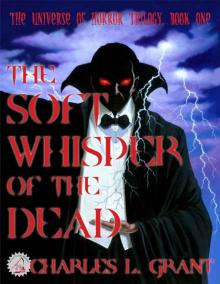 The Universe of Horror Volume 1: The Soft Whisper of the Dead (Neccon Classic Horror)
The Universe of Horror Volume 1: The Soft Whisper of the Dead (Neccon Classic Horror)![[Oxrun Station] Dialing The Wind Read online](http://i1.bookreadfree.com/i/03/19/oxrun_station_dialing_the_wind_preview.jpg) [Oxrun Station] Dialing The Wind
[Oxrun Station] Dialing The Wind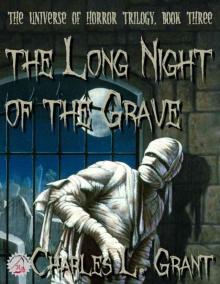 The Universe of Horror Volume 3: The Long Night of the Grave (Neccon Classic Horror)
The Universe of Horror Volume 3: The Long Night of the Grave (Neccon Classic Horror) The Grave - An Oxrun Station Novel (Oxrun Station Novels)
The Grave - An Oxrun Station Novel (Oxrun Station Novels)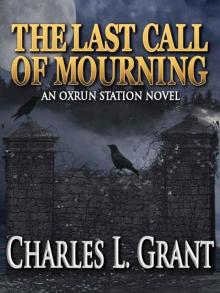 The Last Call of Mourning - An Oxrun Station Novel (Oxrun Station Novels)
The Last Call of Mourning - An Oxrun Station Novel (Oxrun Station Novels) The Complete Short Fiction of Charles L. Grant, Volume IV: The Black Carousel
The Complete Short Fiction of Charles L. Grant, Volume IV: The Black Carousel The Bloodwind - An Oxrun Station Novel (Oxrun Station Novels)
The Bloodwind - An Oxrun Station Novel (Oxrun Station Novels)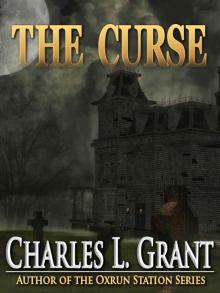 The Curse
The Curse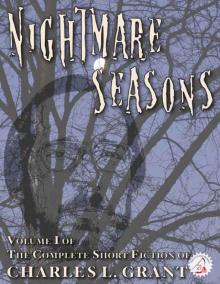 The Complete Short Fiction of Charles L. Grant Volume 1: Nightmare Seasons (Necon Classic Horror)
The Complete Short Fiction of Charles L. Grant Volume 1: Nightmare Seasons (Necon Classic Horror)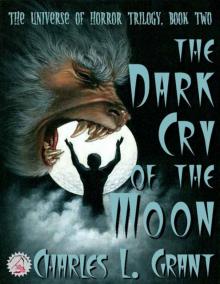 The Universe of Horror Volume 2: The Dark Cry of the Moon (Neccon Classic Horror)
The Universe of Horror Volume 2: The Dark Cry of the Moon (Neccon Classic Horror) Watcher: Based on the Apocalypse (World of Darkness : Werewolf)
Watcher: Based on the Apocalypse (World of Darkness : Werewolf)![[Oxrun Station] The Bloodwind Read online](http://i1.bookreadfree.com/i/03/25/oxrun_station_the_bloodwind_preview.jpg) [Oxrun Station] The Bloodwind
[Oxrun Station] The Bloodwind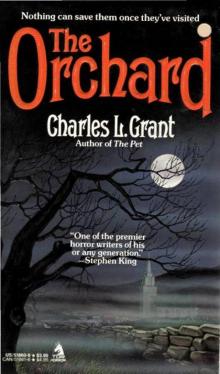 The Orchard
The Orchard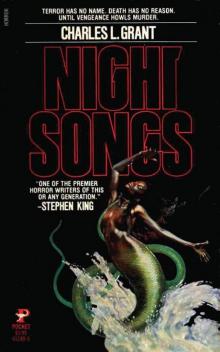 Night Songs
Night Songs Shadows 3
Shadows 3![Symphony - [Millennium Quartet 01] Read online](http://i1.bookreadfree.com/i1/04/02/symphony_-_millennium_quartet_01_preview.jpg) Symphony - [Millennium Quartet 01]
Symphony - [Millennium Quartet 01] The Hour of the Oxrun Dead (Necon Classic Horror)
The Hour of the Oxrun Dead (Necon Classic Horror)![In the Mood - [Millennium Quartet 02] Read online](http://i1.bookreadfree.com/i1/03/31/in_the_mood_-_millennium_quartet_02_preview.jpg) In the Mood - [Millennium Quartet 02]
In the Mood - [Millennium Quartet 02]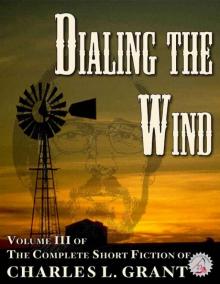 The Complete Short Fiction of Charles L. Grant Volume 3: Dialing the Wind (Neccon Classic Horror)
The Complete Short Fiction of Charles L. Grant Volume 3: Dialing the Wind (Neccon Classic Horror)![[Oxrun Station] The Last Call of Mourning Read online](http://i1.bookreadfree.com/i2/04/05/oxrun_station_the_last_call_of_mourning_preview.jpg) [Oxrun Station] The Last Call of Mourning
[Oxrun Station] The Last Call of Mourning The Pet
The Pet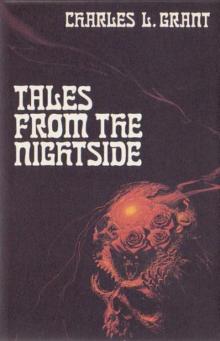 Tales from the Nightside
Tales from the Nightside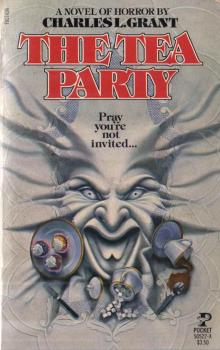 The Tea Party - A Novel of Horror
The Tea Party - A Novel of Horror The Complete Short Fiction of Charles L. Grant Volume 2: The Orchard (Necon Classic Horror)
The Complete Short Fiction of Charles L. Grant Volume 2: The Orchard (Necon Classic Horror) Whirlwind
Whirlwind Jackals
Jackals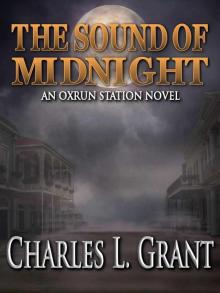 The Sound of Midnight - An Oxrun Station Novel
The Sound of Midnight - An Oxrun Station Novel